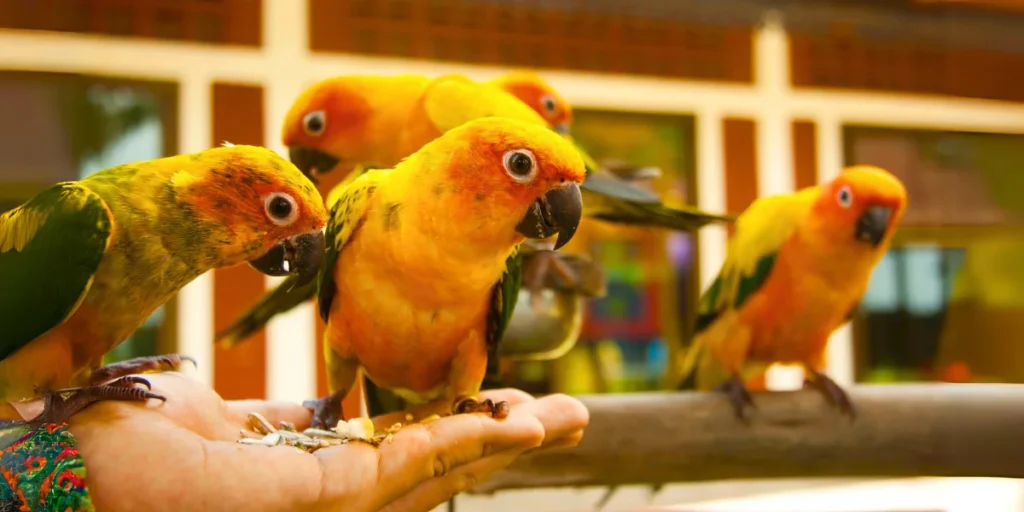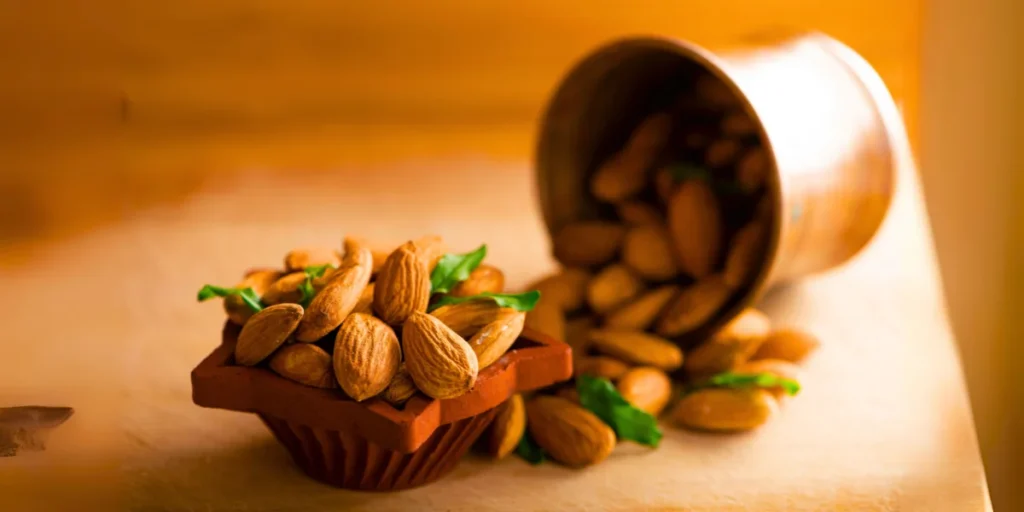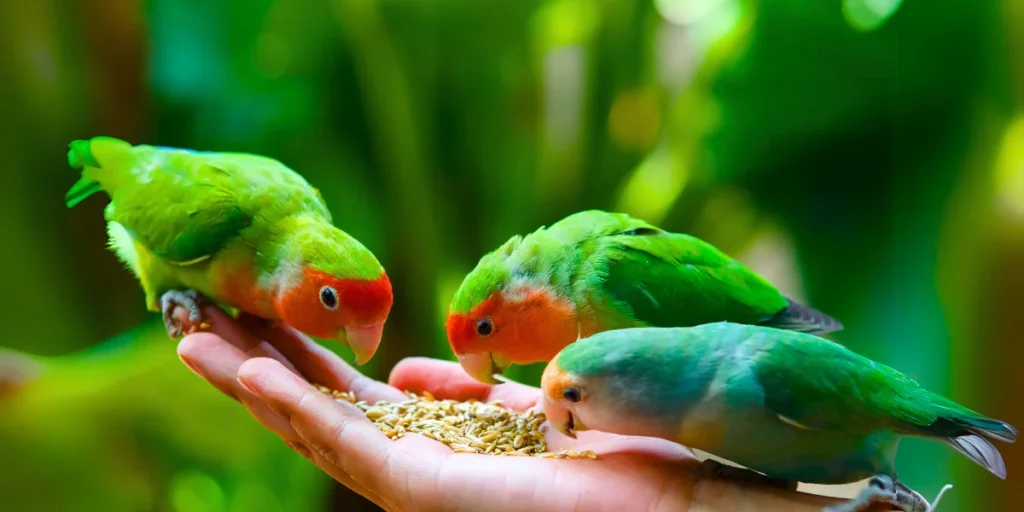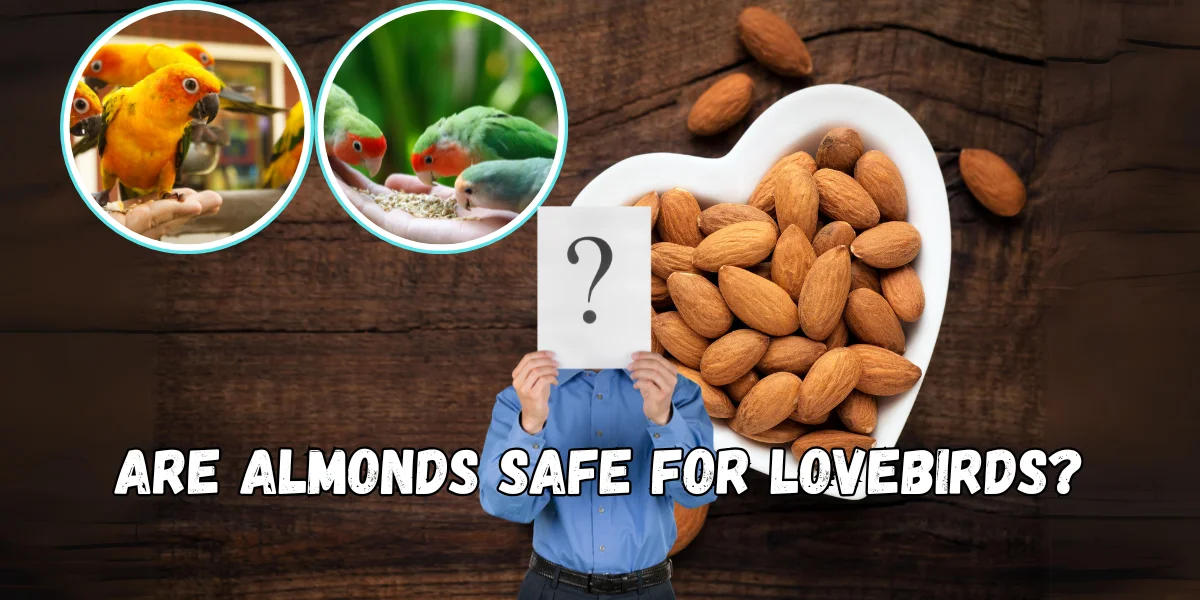Lovebirds are colorful, playful birds that bring joy to many homes. If you own a lovebird, you might wonder if it’s okay to give them almonds. Are almonds healthy for them? Are they safe? In this easy-to-read guide, we’ll explore everything you need to know about feeding almonds to your lovebird. We will also cover how to safely include almonds in their diet, the benefits and risks, and what other healthy treats you can offer.
Are Almonds Safe for Lovebirds?
Yes, lovebirds can eat almonds, but only if prepared properly. There is a lot of confusion about whether nuts like almonds are safe for birds. Here’s the truth:
- Raw, unsalted almonds are safe for lovebirds if given in moderation. However, you should avoid roasted, salted, or flavored almonds because they contain added salt and oils, which can be harmful.
- There is a myth that almonds are dangerous due to cyanide. This is only true for a type of almond called bitter almonds, which are not sold in stores. The sweet almonds we buy are safe for birds when prepared correctly.
Did You Know?
Almonds can help keep your lovebird’s feathers shiny and healthy because they contain healthy fats and vitamin E.

What Makes Almonds Healthy for Lovebirds? Understanding the Nutritional Benefits
Almonds are packed with nutrients that can benefit your lovebird when given in small amounts. Here’s why they can be a good treat:
| Nutrient | Benefit for Lovebirds |
|---|---|
| Healthy Fats | Keeps feathers shiny and skin healthy |
| Protein | Supports muscle growth and tissue repair |
| Vitamin E | Boosts the immune system to prevent illness |
| Magnesium | Helps with strong bones and nerve function |
| Fiber | Aids in digestion and prevents constipation |
While these nutrients are great, remember that almonds are high in fats and calories, so only offer them as an occasional treat.
Nutrition in Almonds: A Breakdown of Key Nutrients
Almonds are packed with essential nutrients, making them a nutrient-rich snack. Here’s a detailed breakdown of the nutritional content in a standard serving (about 28g, or 23 almonds):
| Nutrient | Amount per 28g (approx. 23 almonds) |
|---|---|
| Calories | 160 kcal |
| Total Fat | 14g |
| Protein | 6g |
| Fiber | 3.5g |
| Vitamin E | 7.3mg (37% of daily value) |
| Magnesium | 76mg (19% of daily value) |
| Calcium | 76mg |
| Potassium | 200mg |
| Iron | 1mg |
Additional Nutrients:
Almonds also contain trace amounts of zinc, copper, and B vitamins (like riboflavin and niacin), contributing to their nutrient profile.
Key Points:
- Almonds are calorie-dense, so moderation is key.
- They provide a good amount of fiber and protein.
- Rich in essential vitamins and minerals like Vitamin E and magnesium.

How to Safely Feed Almonds to Lovebirds
If you decide to give your lovebird almonds, it’s important to prepare them properly to ensure they’re safe to eat. Follow these steps:
Step 1: Soak the Almonds
- Soak almonds in water for 8-12 hours to soften them. This makes them easier for lovebirds to chew and digest.
- Soaking also helps reduce tannins, which are compounds that can sometimes upset a bird’s stomach.
Step 2: Remove the Skin
- After soaking, peel off the brown skin. The skin may contain tannins that can be harsh on sensitive bird stomachs.
- Removing the skin also makes it easier for your bird to eat the almonds.
Step 3: Cut into Small Pieces
- Whole almonds are too big for lovebirds and can be a choking hazard. Always chop them into small pieces.
- You can also crush the almonds into a powder and sprinkle it over your bird’s regular food for extra nutrition.
Step 4: Feed in Moderation
- Limit the amount of almonds to once or twice a week. Feeding too many can lead to obesity because almonds are high in calories.
Helpful Tip
Offer almonds as a treat or reward during training sessions. This makes feeding time more enjoyable for your bird.
Potential Risks of Feeding Almonds to Lovebirds
While almonds can be a healthy treat, there are some risks if they are not prepared or given correctly.
| Risk | Signs to Watch For |
|---|---|
| High Fat Content | Weight gain, less energy, or becoming overweight |
| Allergic Reaction | Sneezing, feather plucking, or digestive issues |
| Choking Hazard | Difficulty breathing or swallowing |
If you notice any of these signs, stop feeding almonds immediately and consult a vet.
Important Reminder
Always introduce any new food slowly. Start with a small amount and watch for any reactions.
Almonds as Part of a Balanced Diet for Lovebirds
Almonds should only be given as a treat and not as a main part of your lovebird’s diet. Here’s what a healthy diet for lovebirds should include:
- High-quality birdseed mix: This should be their main food source. It contains proteins, healthy fats, and other nutrients.
- Fresh fruits and vegetables: Offer small amounts of bird-safe veggies like carrots, bell peppers, spinach, and apples (without seeds).
- Protein sources: You can give your lovebird a small amount of boiled egg or mealworms for extra protein.
Why Balance is Important
Lovebirds need a varied diet to stay healthy and happy. Just like people, they can get bored if they eat the same food every day.

Alternatives to Almonds: Other Healthy Treats for Lovebirds
If you’re not sure about feeding almonds, there are plenty of other safe options you can try:
- Walnuts: Rich in omega-3 fatty acids but should be given in small amounts.
- Pistachios (unsalted): Another healthy option, but make sure they are free of shells.
- Sunflower Seeds: These are high in fats, so offer them sparingly to avoid weight gain.
Homemade Bird Treat Recipe
Here’s a simple recipe to make a healthy treat for your lovebird:
Almond & Seed Treats
- Ingredients: 1 tablespoon crushed almonds, 2 tablespoons birdseed mix, 1 teaspoon honey, and 1 tablespoon oat flour.
- Instructions:
- Mix all the ingredients together to form a dough.
- Roll into small balls and let them chill in the fridge for 1 hour.
- Serve these treats once a week for a fun and healthy snack.
Myths About Feeding Nuts to Lovebirds
Let’s clear up some common myths:
- Myth: All nuts are safe as long as they are unsalted.
Truth: Some nuts, like macadamia nuts, are toxic to birds. - Myth: Lovebirds can eat nuts with shells.
Truth: Hard shells can be a choking hazard. Always give nuts without shells. - Myth: Nuts can replace a bird’s diet.
Truth: Nuts should only be an occasional treat. A balanced diet is necessary for your lovebird’s health.
FAQs
Can Lovebirds Eat Almond Butter?
Yes, but only if it’s pure and unsweetened. Many store-bought almond butters have added sugar and oils, which can be harmful.
Can Lovebirds Eat Roasted Almonds?
No, roasted almonds usually contain added salt and oils that are not good for birds. Always stick to raw, unsalted almonds.
What Should I Do If My Lovebird Chokes on an Almond?
If you see your bird struggling to breathe or swallow, remove any visible food from its beak and contact an avian vet immediately.
Final Thoughts: Should You Feed Almonds to Your Lovebirds?
Almonds can be a healthy and enjoyable treat for your lovebird if you follow the proper steps. Remember to soak, peel, and chop the almonds before feeding them to ensure safety. A varied diet that includes seeds, fresh fruits, and vegetables, along with occasional treats like almonds, will keep your lovebird happy and healthy.
By following these guidelines, you can safely include almonds in your lovebird’s diet while ensuring they get all the nutrients they need.
Bonus Tip
If you want to bond with your lovebird, try hand-feeding them small pieces of almonds. This can help build trust and strengthen your relationship.
I hope this guide answers all your questions about whether lovebirds can eat almonds. Remember, a balanced diet and occasional treats will help your feathered friend stay healthy and happy for years to come!
